In the realm of livestock nutrition, the quality of feed plays a paramount role in the overall health and productivity of animals. This article delves into the importance of high-quality livestock feed, highlighting the essential nutrients required for optimal animal health.
By exploring the factors influencing feed quality and providing practical strategies for selecting a top-notch feed, readers will gain insights into the secrets of maximizing nutritional benefits through optimization.
Importance of High-Quality Livestock Feed

High-quality feed is of utmost importance for ensuring optimal nutrition and overall health of animals.
Organic food, in particular, offers several advantages over conventional one. Organic is produced without the use of synthetic chemicals, pesticides, or genetically modified organisms (GMOs), making it a healthier choice for animals.
It contains higher levels of essential nutrients and antioxidants, which can improve the immune system and overall well-being of livestock. Additionally, it is free from antibiotics and hormones that are often used in conventional feed, reducing the risk of antibiotic resistance and potentially harmful effects on animals and consumers.
Additives also play a crucial role in enhancing the quality of livestock feed. These additives can improve digestion, promote growth, and enhance the absorption of nutrients, ensuring that animals receive the necessary vitamins, minerals, and amino acids for optimal health and performance.
Investing in high-quality organic food and utilizing additives can have a significant impact on the overall productivity and profitability of livestock operations.
Essential Nutrients for Livestock Health
To ensure optimal nutrition and overall health of livestock, it is essential to understand the role of various essential nutrients in their diet. Livestock requires a balanced diet that includes carbohydrates, proteins, fats, vitamins, minerals, and water. These nutrients play vital roles in growth, reproduction, immune function, and overall metabolic processes.
Optimal ratios are crucial in providing the right balance of nutrients. The ratio of carbohydrates, proteins, and fats should be carefully measured to meet the specific needs of each livestock species and their life stage. Supplementation can also be used to enhance nutrient intake. This can include adding vitamins, minerals, or specific additives to the feed to address any deficiencies or to optimize performance.
Livestock owners and managers need to work closely with nutritionists and veterinarians to develop a feeding program that meets the specific requirements of their animals. Regular monitoring and adjustment of rations, based on the animals’ needs and performance, can help ensure that the essential nutrients are provided in the right amounts for optimal health and productivity.
Factors Affecting Quality

Understanding the factors influencing feed quality is essential for optimizing livestock nutrition. Processing and storage are two critical factors that directly impact the quality of feed.
Proper processing involves procedures such as grinding, mixing, and pelleting, which enhance digestibility and nutrient availability. This ensures that animals can efficiently utilize the nutrients in the feed for growth and production.
Additionally, storage plays a crucial role in maintaining quality. Factors such as moisture content, temperature, and exposure to pests and contaminants can affect the nutritional value of the feed. Implementing appropriate storage practices, such as keeping it dry, cool, and protected from pests, is essential for preserving quality and preventing the growth of harmful microorganisms.
Strategies for Selecting Quality Products
Livestock producers can employ effective criteria to select nutritious livestock feed. One important strategy is selecting reliable suppliers. Producers should choose suppliers who have a good reputation for providing high-quality products. They should also consider factors such as the supplier’s track record, certifications, and customer reviews.
Additionally, evaluating ingredients is crucial. Producers should carefully examine the nutritional composition of the food, ensuring that it meets the specific requirements of their livestock. This involves analyzing the protein, carbohydrate, fat, vitamin, and mineral content. Producers should also consider the source of the ingredients, ensuring that they are of high quality and free from contaminants.
Maximizing Nutritional Benefits Through Optimization

By optimizing the composition and formulation of livestock feed, producers can maximize the nutritional benefits for their animals, leading to improved health and performance.
Improving efficiency is crucial in livestock production as it directly affects the profitability and sustainability of the industry. Formulation techniques play a vital role in achieving this goal.
Producers can optimize feed by balancing the nutrients according to the specific requirements of the animals, taking into consideration factors such as age, weight, and production stage. The use of mathematical models and computer software can aid in formulating cost-effective and nutritionally balanced feed, ensuring that the animals receive the necessary nutrients for optimal growth and productivity.
Moreover, fine-tuning composition can enhance digestibility and nutrient utilization, further improving feed efficiency.
Frequently Asked Questions
What Are the Main Differences Between High-Quality and Low-Quality Livestock Feed?
High-quality livestock feed offers numerous benefits, such as improved animal health, enhanced growth and productivity, and higher nutrient absorption. Conversely, low-quality kind poses risks like nutrient deficiencies, reduced immune function, and impaired overall performance in livestock.
How Can the Quality Impact Animal Health and Performance?
The quality of livestock feed plays a crucial role in animal performance and health. Meeting the nutritional requirements of animals through high-quality feed leads to improved growth, milk production, and overall well-being.
Are There Any Specific Regulations or Standards in Place to Ensure the Quality of Livestock Feed?
Regulatory compliance and industry standards play a crucial role in ensuring the quality of feed. These measures are in place to protect animal health and performance and to maintain the integrity of the livestock industry.
What Are Some Common Challenges Faced by Farmers When Selecting Quality Livestock Feed?
Challenges faced by farmers when selecting quality livestock feed include ensuring proper nutrition, managing cost-effectiveness, avoiding contamination, and meeting the specific dietary needs of different livestock species. These challenges require careful evaluation and consideration of various factors.
Can You Provide Some Tips on How to Optimize the Nutritional Benefits of Livestock Feed Through Feeding Practices?
To optimize the nutritional benefits of feed through feeding practices, it is crucial to consider the specific nutritional requirements of the animals and employ appropriate feeding techniques. This ensures that the animals receive a balanced diet and achieve optimal growth and health.




